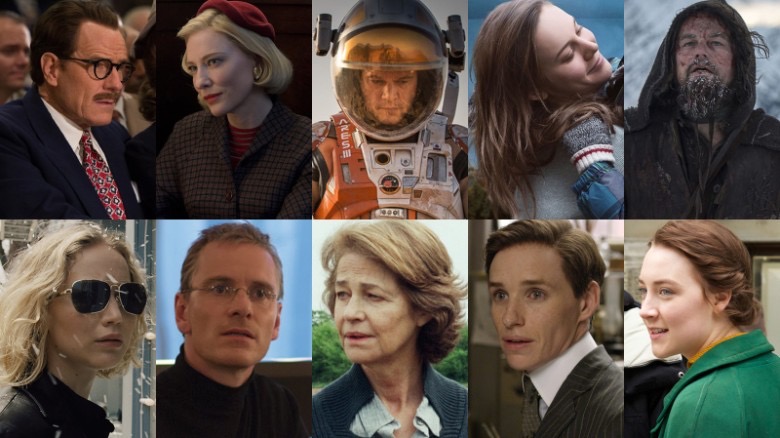The revival of #OscarsSoWhite
Lack of racial diversity amongst Oscar nominees sparks controversy
The Academy Awards is the one awards show that reminds us all that quality film still exists amidst the cheesy chick flicks, vulgar comedies, and explosion-ridden action movies that dominate the industry. Informally known as the Oscars, the awards show has made its mark as the epitome of old Hollywood elegance since the first ceremony in 1929. While there are several other awards shows within the industry, to win an Oscar is the ultimate dream of any actor. Since nominations are awarded to the finest performances in film, it seems obvious that the absolute best performance of the year would win, right? Wrong. This year, to public dismay, the nominees in major categories consisted completely of Caucasian actors. The “whiteness” of the field of nominees exposes the myopia of the nominating body, and the structural biases of the industry that feed it.
The controversy began last year, when #OscarsSoWhite first lit up the Twitter-sphere. The social media uproar was due to the disregard shown towards actors of colour at the 87thAcademy Awards. The outrage was mostly due to the omission of actor David Oyelowo, and director Ava DuVernay, from the epic historical drama of the year, Selma. When this year’s list of nominees was released, a similar reaction ensued over the lack of nominations for phenomenal performances from the African American casts of Straight Outta Compton, Creed, and Beasts of No Nation. While these films were rewarded through the Golden Globes, Critics Choice, and Screen Actors Guild, they received no recognition from the Academy. This ignorance sparked the same contention over racial biases in the film industry, reviving the worldwide trending hashtag.
#OscarsSoWhite has received nationwide attention, even from several high profile celebrities. Amongst all the public statements made for social justice, one of the most intriguing comments made in the media was from two-time Oscar nominee, Viola Davis. Davis recently made awards show history as the first African American woman to win the Primetime Emmy Award For Outstanding Lead Actress in a Drama Series. After her powerful acceptance speech, she has become a firm advocate for equality in the industry. Naturally, she weighed in on the Academy’s diversity problem. Her claim was that the problem was not with the Oscars themselves, but with the Hollywood movie-making system. She questioned Entertainment Weekly, “The films that are being made, are the big-time producers thinking outside of the box in terms of how to cast the role? Can you cast a black person in that role?” Davis’ statement brings awareness to the unavailability of certain roles for black actors in the film industry.
Out of the fifteen African Americans actors that have ever won an Oscar, the majority of them have only played distinctly “black” characters. Take Octavia Spencer’s Best Supporting Actress win in 2011 for her role as a maid in The Help, for example. Or when Lupita Nyong’o won Best Supporting Actress in 2014 for her role as a captive servant in 12 Years A Slave. Even Halle Berry, the only black woman to ever win an Oscar for Best Actress, won because of her performance as an abusive mother in Monster’s Ball. This type-casting of black people as servants to their white masters, or as disruptive members of society, only promotes the limited availability of roles for actors of colour in Hollywood. These restricting circumstances only make the ignorance of black cinematic achievement by the Academy Awards even more frustrating.
The overwhelming attention surrounding this lack of racial diversity has also brought awareness to the fact that it is not only African Americans that are facing these absurd biases in the entertainment industry. After 88 years, there has still never been an Oscar nomination for a Native American actor, filmmaker, or writer. There has also been sparse representation of other minority groups, such as Latinos and Asians. Issues with racial inclusivity are just the tip of the iceberg. The Oscars have an even worse representation of sexual diversity. Only four women have ever been nominated for Best Director. Seeing as the Academy is only 23% women, this is no surprise. In addition, there is a complete absence of legitimate LGBTQ representation amongst Oscar nominees. When Hollywood veteran, Ian McKellen, waded into the Oscar’s diversity debate, he was quick to point out that no openly gay actor has ever won an Oscar. While several trophies were handed to actors that portrayed homosexual characters, there has been a complete lack of LGBTQ representation amongst the nominees themselves. Basically, the Academy is subliminally conveying the message that primarily straight, white, males deserve recognition. In a relatively modern, liberal society, this homogeneous attitude towards race and sexuality is unacceptable.
So when you tune in to the 88th Academy Awards on February 28, take some time to question your predictions. How do you think Best Picture frontrunner, Spotlight, would have compared to Straight Outta Compton, if the latter were given the chance? Do you think IdrisElba’s performance in Beasts of No Nation was comparable to Tom Hardy’s in The Revenant? Itis important that we ask ourselves these questions, so that all brilliant performances in film are acknowledged, regardless of race, gender, or sexual identity. Then maybe someday every starry-eyed member of the film industry will have an equal shot at the coveted golden Oscar.
